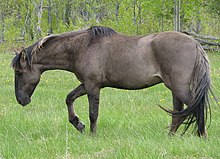Sorraia

A Sorraia stallion
|
|
| Conservation status | DOM |
|---|---|
| Country of origin | Indigenous to the southwestern Iberian peninsula, today present mainly in Portugal and Germany |
| Traits | |
| Distinguishing features | Lean, leggy conformation, good withers, slim neck, convex profile; grulla or dun, typically without white markings |
The Sorraia is a rare breed of horse indigenous to the portion of the Iberian peninsula, in the Sorraia River basin, in Portugal. The Sorraia is known for its primitive features, including a convex profile and dun coloring with primitive markings. Concerning its origins, a theory has been advanced by some authors that the Sorraia is a descendant of primitive horses belonging to the naturally occurring wild fauna of Southern Iberia. Studies are currently ongoing to discover the relationship between the Sorraia and various wild horse types, as well as its relationship with other breeds from the Iberian Peninsula and Northern Africa.
Members of the breed are small, but hardy and well-adapted to harsh conditions. They were occasionally captured and used by native farmers for centuries, and a remnant population of these nearly extinct horses was discovered by a Portuguese zoologist in the early 20th century. Today, the Sorraia has become the focus of preservation efforts, with European scientists leading the way and enthusiasts from several countries forming projects and establishing herds to assist in the re-establishment of this breed from its current endangered status.
The Sorraia breed stands between 14.1 and 14.3 hands (57 and 59 inches, 145 and 150 cm) high, although some individuals are as small as 12.3 hands (51 inches, 130 cm) The head tends to be large, the profile convex, and the ears long. The neck is slender and long, the withers high, and the croup slightly sloping. The legs are strong, with long pasterns and well-proportioned hooves. These horses have good endurance and are easy keepers, thriving on relatively little fodder. They have a reputation for being independent of temperament, but tractable.
...
Wikipedia
